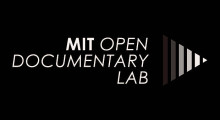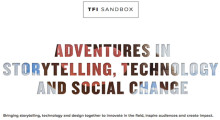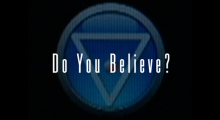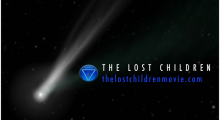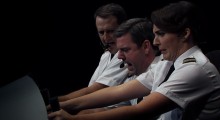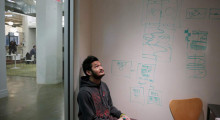Transmedia
Filmmaking - Transmedia
-
Should Filmmakers Learn to Code?

“Do filmmakers need to learn to code?” The inspiration for this blog series came from this question. Software is part of our everyday life; in some circles coding is seen as the new literacy and a means of empowerment. At MIT’s Comparative Media Studies, where the MIT Open Documentary Lab is housed, we are confronted with this question on a regular basis as humanists sitting in a land of hackers who marvel at the power and elegance of code. Fluent in many programming languages, some of them believe that we all should be. In an effort to make coding more […]
-
Digital Publishing for Filmmakers: The Karada and The Silent History

Transmedia by definition requires producers to work in more than one medium; the fun, most of the time, is in devising ways to carry a narrative (or narrative world) across different platforms, making them engage with each other while best utilizing each platform’s unique capabilities. Sometimes, however, it’s sufficient to work exclusively in a single non-film medium — and it can get the creative juices flowing if you’re stuck in a rut. After all, Bergman had his fiction (besides his theater work), Woody Allen has his clarinet, and Pasolini had pretty much everything. I’ve recently been working more on my […]
-
TFI Sandbox for Documentary Transmedia

As transmedia has moved past its buzzword beginnings, resources and organizations have sprung up to support the creative community involved in multiplatform narratives. The latest of these comes from the Tribeca Film Institute, which last week launched an online hub for all things transmedia — particularly nonfiction — called TFI Sandbox. The name, of course, indicates a place where producers can come to play and develop techniques, strategies, and specific projects, and thus the website offers a plethora of training material as well as links, resources, and, perhaps most importantly, an open door for producers to get familiar with TFI […]
-
Interactivity Through Biology with many worlds

The words “interactive film” obviously evoke some kind of audience engagement, but what that actually means can — and does — change with every project. While there have been a lot of innovations with screenings in public venues, interactive films often tend to play best online or on mobile devices where viewers can input information and make narrative decisions. The new short film many worlds seeks to turn this on its head a little bit and redefine interactivity by, first, making it completely unconscious for viewers and, second, allowing it to take place in a traditional theater. Billed as “a […]
-
Lydia Antonini and Josh Feldman on Halo 4: Forward Unto Dawn

At the beginning of the year, Filmmaker’s Scott Macaulay pointed out again — like many others have as well — that features are no longer the default format-of-choice for indie filmmakers. And as forms like the web series mature, we’re seeing more of the kinks getting worked out and more filmmakers and others finding innovative ways to release and promote new work. Take Netflix’s high-profile series House of Cards, which was just released all at once instead of in spaced-out (i.e. weekly) increments; we’ve yet to see the show’s long tail, but its initial viewer data (that is, its engagement […]
-
Immersive Storytelling for The Lost Children Pt. 4

Film as Software The final installment of this series is about the actual screening of The Lost Children feature film at Film Society of Lincoln Center. In working out this screening, I am working with a concept called “Film as Software.” What exactly does this mean? To me it means film taking on some of the qualities of software. One of those qualities is the ability to react to user input in real time. That’s my take. But I asked Mike and Hal of Murmur to join in on the discussion. Murmur is the hybrid studio/technology company handling the interactive […]
-
Immersive Storytelling for The Lost Children Pt. 3

For as long as I can remember, I’ve been a lover of science. Astronomy especially. I grew up watching Carl Sagan’s Cosmos, and James Burke’s great series Connections. Even today, I am indebted to writers like Neil deGrasse Tyson, Stephen Hawking and Sean Carroll for writing about subjects like black holes and the nature of time in ways that a layman like me can understand. I think people like this are imperative to society because many of the subjects they study are critical to us as a race. Two of those subjects are NEOs (Near Earth Objects) and astrobiology. NEOs […]
-
3D Plane Crashes and Charlie Victor Romeo

They came up with a great idea. Within months, they received the highest critical acclaim. They continued to perform and planned to make a movie of it all. It took 13 years. At Sundance 2013, in the New Frontiers section, the 3D film version of the acclaimed performance piece about plane crashes, Charlie Victor Romeo, will have its premiere. A few weeks after the shoot was completed, and as an Associate Producer and behind-the-scenes documentarian of the film, I asked several of the projects principal creators to share an inside account of the transformation. First, Charlie Victor Romeo was a […]
-
Stories From POV Hackathon

I am continuing my quest to better understand the wild new world of films that aren’t just on your TV or in your movie theater — but those that tell stories interactively, that are native to the web, that you can carry around on your phone, and whatever else clever storytellers are dreaming up (lest we be restricted to calling it all the ugly word transmedia). So, I share with you today the stories of the POV Hackathon. POV, the incredible PBS documentary series, hosts this event for documentary filmmakers to connect with designers and developers in the tech community, […]
-
Creative Code

Developing an understanding of code is a valuable skill. In fact its now a 21st century storytelling reality. While it’s not critical for you to rush off and learn how to code, it wouldn’t hurt to become more familiar with the terminology, process and realities of producing digital / interactive projects. As filmmakers expand their work beyond a single screen new roles such as creative technologists are emerging to bridge the gap between tech and story. The role has been adapted within ad agencies, interactive firms and media companies as a way to plan and execute digital strategies. At the […]
